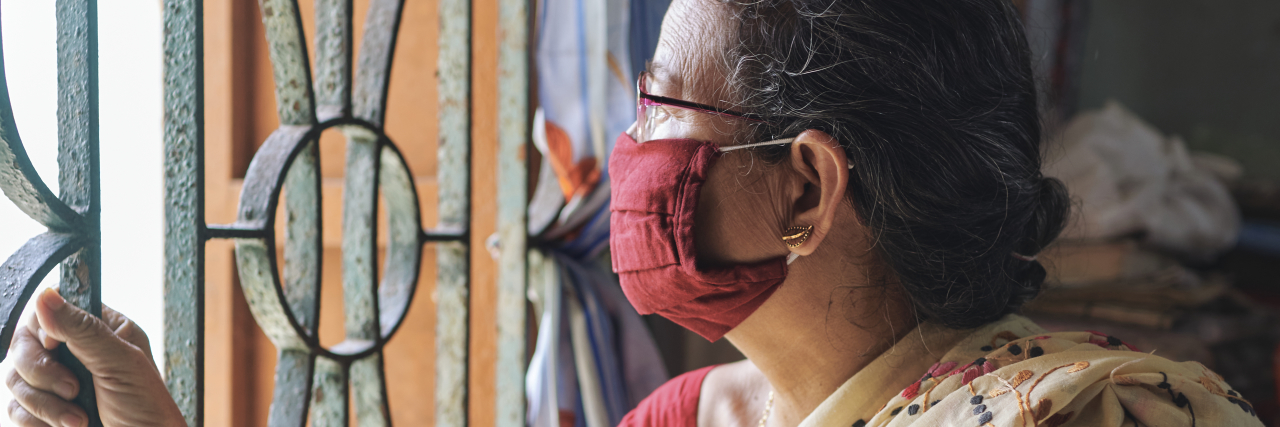Dear World, Please Pay Attention to India's COVID-19 Mental Health Crisis
Editor's Note
If you experience suicidal thoughts or have lost someone to suicide, the following post could be potentially triggering. You can contact the Crisis Text Line by texting “START” to 741741.
Maya is a senior citizen, a widow living in a small town in India. Her son’s family lives in a metropolis. So far all of them have stayed safe of COVID-19, and yet all that seems to catch Maya’s eyes in the local newspaper is news about death, medical negligence or deaths by suicide. This gives her sleepless nights and sometimes severe anxiety so much so that she doesn’t talk to even a neighbor from across her lawn.
Kartik is a young professional, nobody in his family or immediate friend circle has lost a life to COVID-19. A few who were infected recovered soon, yet every time he steps out a fear grips him. He starts feeling sad about the queues of people everywhere for essentials. He tried volunteering for a relief work helpline but hearing the stories of misery made him so sad that he felt guilty of having food, shelter and health.
India is under a humongous second wave of the ongoing pandemic. The sheer number of people directly being affected by this is so large and hence the number of people feeling mental distress due to that is large too. Those who have lost a dear one are in some stages of grief and coping. Those who are still struggling with their own recovery of that of a loved one in the dearth of resources are going through a plethora of emotional upheavals. Healthcare and frontline workers are under huge distress. People with a pre-existing mental health condition or any kind of disability are also at a higher risk of slipping further away into the abyss of lack of care and support.
But other than these obviously vulnerable groups, this prolonged pandemic is now distressing everyone, even those who have had a remote brush with it. The psychosocial wellbeing of the entire Indian society, across the various intersections of gender, class, caste and region have been severely impacted by COVID-19.
In May 2020 the UN Secretary-General stressed “ The urgent need for investment in mental health in response to the COVID-19 pandemic” in a policy brief: COVID-19 and the Need for Action on Mental Health. Yet India falls far behind on all the scales– funds allocated for mental healthcare, number of trained healthcare professionals. Removal of taboo and stigma and addressing the intersectional nature of mental health concerns of such a diverse society.
According to the Lancet Commission on global mental health and sustainable development, “Many people who previously coped well, are now less able to cope because of the multiple stressors generated by the pandemic. Those who previously had few experiences of anxiety and distress may experience an increase in number and the intensity of these and some have developed a mental health condition.”
Most children in India have been out of school for more than a year now. This has not only led to a learning gap but is a huge stressor for the children and their families. Though most places in India now have ease of movement, a lot of people are in self-imposed isolation due to the fear and uncertainty of getting the support of they fall sick. Economic disruptions have made family environments financially stressed and hence the mental health scenario also doesn’t remain conducive for long there.
What some researchers are now calling the “Covid Anxiety Syndrome” is prevalent in India. Some characteristics include people trying not to touch anything at all, avoiding all forms of public transport, worrying all the time and constantly monitoring environments and other people for the presence of the virus.
According to a survey 61% of Indians feel angry, upset, depressed. Considering India’s huge population that number will be running to a score of millions easily.
In my first-hand experience as a mental health first-aider mentoring peer-support groups and volunteering at various helplines/initiatives, several of my colleagues and I gathered that Indian men and boys find it more difficult than women and girls to speak out about mental distress or to seek help. This is primarily due to cultural and social beliefs and stereotypes of masculinity that teach them to “control emotions,” “don’t cry” and “stay tough.”
Lack of awareness and taboos around mental health are also so huge in India that even if a family member’s or friend’s distress is identified and recognized, it is kept hidden like a dirty secret, and instead of seeking appropriate medical help people turn to fake doctors, religious preachers or the like for “miracle cures.”
In India, there is an urgent need to address psychosocial wellbeing that is hugely intersectional due to the uniqueness of our society.
Lead image via Getty Images

